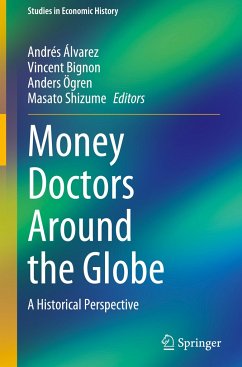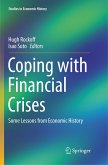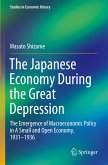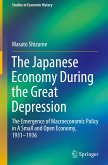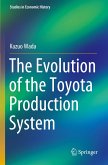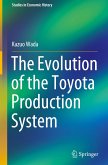Money Doctors Around the Globe
A Historical Perspective
Herausgegeben:Álvarez, Andrés; Bignon, Vincent; Ögren, Anders; Shizume, Masato
Money Doctors Around the Globe
A Historical Perspective
Herausgegeben:Álvarez, Andrés; Bignon, Vincent; Ögren, Anders; Shizume, Masato
- Gebundenes Buch
- Merkliste
- Auf die Merkliste
- Bewerten Bewerten
- Teilen
- Produkt teilen
- Produkterinnerung
- Produkterinnerung
This book focuses on worldwide historical experiences of monetary reforms and the reformist minds behind them: the money doctors. The process of doctoring is the process of listening to many pieces of information and sorting them in order to correctly diagnose the causes of the problem and derive the appropriate cure, if it exists. A money doctor is "a person who, helped by theoretical and practical knowledge, advises and/or proposes to act on how to build a stable monetary and financial system or to repair ongoing monetary turbulences." Economists and policy makers are money doctors when…mehr
Andere Kunden interessierten sich auch für
![Money Doctors Money Doctors]() Marc Flandreau (ed.)Money Doctors303,99 €
Marc Flandreau (ed.)Money Doctors303,99 €![Coping with Financial Crises Coping with Financial Crises]() Coping with Financial Crises67,99 €
Coping with Financial Crises67,99 €![The Japanese Economy During the Great Depression The Japanese Economy During the Great Depression]() Masato ShizumeThe Japanese Economy During the Great Depression85,99 €
Masato ShizumeThe Japanese Economy During the Great Depression85,99 €![The Japanese Economy During the Great Depression The Japanese Economy During the Great Depression]() Masato ShizumeThe Japanese Economy During the Great Depression82,99 €
Masato ShizumeThe Japanese Economy During the Great Depression82,99 €![The Evolution of the Toyota Production System The Evolution of the Toyota Production System]() Kazuo WadaThe Evolution of the Toyota Production System90,99 €
Kazuo WadaThe Evolution of the Toyota Production System90,99 €![Industrial Districts in History and the Developing World Industrial Districts in History and the Developing World]() Industrial Districts in History and the Developing World90,99 €
Industrial Districts in History and the Developing World90,99 €![The Evolution of the Toyota Production System The Evolution of the Toyota Production System]() Kazuo WadaThe Evolution of the Toyota Production System90,99 €
Kazuo WadaThe Evolution of the Toyota Production System90,99 €-
-
-
This book focuses on worldwide historical experiences of monetary reforms and the reformist minds behind them: the money doctors. The process of doctoring is the process of listening to many pieces of information and sorting them in order to correctly diagnose the causes of the problem and derive the appropriate cure, if it exists. A money doctor is "a person who, helped by theoretical and practical knowledge, advises and/or proposes to act on how to build a stable monetary and financial system or to repair ongoing monetary turbulences." Economists and policy makers are money doctors when their involvement includes the observation and diagnostic of the monetary and financial troubles and the proposition for a cure. Each contribution highlights the theoretical underpinning of the doctors, and the key factors for the success or failures of the reform they have promoted.
We collect cases from Americas, Asia, Europe, and Oceania from the 16th to the 20th century anddiscuss their aims, strategies, and consequences to draw implications for today.
We collect cases from Americas, Asia, Europe, and Oceania from the 16th to the 20th century anddiscuss their aims, strategies, and consequences to draw implications for today.
Produktdetails
- Produktdetails
- Studies in Economic History
- Verlag: Springer / Springer Nature Singapore / Springer, Berlin
- Artikelnr. des Verlages: 978-981-97-0133-9
- 2024
- Seitenzahl: 384
- Erscheinungstermin: 21. Juni 2024
- Englisch
- Abmessung: 241mm x 160mm x 27mm
- Gewicht: 684g
- ISBN-13: 9789819701339
- ISBN-10: 9819701333
- Artikelnr.: 69692754
- Herstellerkennzeichnung Die Herstellerinformationen sind derzeit nicht verfügbar.
- Studies in Economic History
- Verlag: Springer / Springer Nature Singapore / Springer, Berlin
- Artikelnr. des Verlages: 978-981-97-0133-9
- 2024
- Seitenzahl: 384
- Erscheinungstermin: 21. Juni 2024
- Englisch
- Abmessung: 241mm x 160mm x 27mm
- Gewicht: 684g
- ISBN-13: 9789819701339
- ISBN-10: 9819701333
- Artikelnr.: 69692754
- Herstellerkennzeichnung Die Herstellerinformationen sind derzeit nicht verfügbar.
Andrés Álvarez is an associate professor in the Economics Department at Universidad de Los Andes, in Bogota. He has made contributions to the monetary and banking history of Colombia and to the study of economic thought. He is currently working on a project on the evolution of social mobility in Colombia in the long run and on the determinants of educational segregation in the country. Andrés is co-editor with Jimena Hurtado of a History of Colombian Economic Thought: The Economic Ideas that Built Modern Colombia, Routledge. He recently published with Camilo Gómez and Hernando Zuleta "Bequests, Imperfections in Factor Markets, and Long-Run Inequality: A Theoretical Assessment of Piketty" in the Journal of Income Distribution. Vincent Bignon is a senior research advisor and the counselor of the communication director of Bank of France after having been the advisor of the chief economist. He is also an associate professor at the Aix-Marseille School of Economics in the University of Aix-Marseille and a research fellow of the Center for European Policy Research. His published research deals with the theory and history of money and the factors of economic development of Europe. He is the author of The Other Way: A Narrative History of Banque de France, with Marc Flandreau, published in Sveriges Riksbank and the History of Central Banking by Rodney Edvinson, Tor Jacobson, Daniel and Waldenstrom at Cambridge University Press, or Big Push or Big Grab? Railways, Government Activism and Export Growth in Latin America, 1865-1913, with Rui Esteves et Alfonso Herranz-Loncán, published by The Economic History Review in 2015, of Bagehot for Beginners: The Making of Lending of Last Resort Operations in the Mid-19th Century, with Marc Flandreau and Stefano Ugolini, published by The Economic History Review in May 2012, of Illiquid Collateral and Bank Lending during the European Sovereign Debt Crisis, with Jean Barthélemy and Benoit Nguyen, published by Economics and Statistics in 2017 and of Historical monetary and financial statistics for policymakers: towards a unified framework, with Claudio Borio, Øyvind Eitrheim,Marc Flandreau,Clemens Jobst, Jan F. Qvigstad and Ryland Thomas published by the Bank of International Settlement Papers in 2022. He has taught at the universities of Créteil in Paris, in Sciences Po, in Nanterre and in Geneva and Bern in Switzerland and has been a visiting researcher at the Universities of Pennsylavania, Basel, George Mason University, Humboldt in Berlin, FVG in Sao Paulo and Los Andes in Bogota. His undergraduate degree is from La Sorbonne University and Ecole Normale Supérieure Paris-Saclay and his Ph.D. from Ecole Polytechnique. Anders Ögren is professor in economic history and holds a chair at the Department of Economic History, Uppsala University in Sweden. His main fields of study are financial and monetary history, business history and history of economic thought. He is also engaged in a project on the economic history of the Vikings. Most recent publications are Ögren, A. (2023) "Viking camps, an economic interpretation" in Hedestierna-Jonson, C & Garcia-Losquiño, I (Eds.) Viking camps - case studies and comparisons, pp. 294-305 Routledge, Kenny, S., Ögren, A. & Zhao, L. (2023) "The highs and the lows: bank failures in Sweden through inflation and deflation, 1914-1926" European Review of Economic History 27:2, pp. 223-249, Ögren A, Hedenstierna-Jonson C, Ljungkvist J, Raffield B, and Price N. (2022) "New institutional economics in Viking studies. Visualising immaterial culture". Archaeological Dialogues 29:2, pp.172-187, Ögren, A. & Trautwein, H-M. (2022) "Central Bank Cooperation and Lending of Last Resort in the Scandinavian Monetary Union" Economic History Yearbook/Jahrb. f. Wirtschaftsg. 63:2, pp. 433-494 and Ljungberg, J. & Ögren, A. (2022) "Discipline or international balance: the choice of monetary systems in Europe" The European Journal of the History of Economic Thought 29:2 pp. 218-245. Masato Shizume is a professor of economics at Waseda University. His research focuses on the history of money and credit and the emergence and developments of the modern society and state in Japan. He has published articles, books, and book chapters on the monetary history of Japan both in English and Japanese. His recent publications include The Japanese Economy During the Great Depression: The Emergence of Macroeconomic Policy in A Small and Open Economy, 1931-1936, 2021; "Strategic Central Bank Communication: Discourse Analysis of the Bank of Japan's Monthly Report," Journal of Economic Dynamics and Control, vol. 100, 2019 (with Kohei Kawamura, Y¿hei Kobashi, and K¿z¿ Ueda); "Historical Evolution of Monetary Policy (Goals and Instruments) in Japan: From the Central Bank of an Emerging Economy to the Central Bank of a Mature Economy," Stefano Battilossi, Youssef Cassis, and Kazuhiko Yago, editors, Handbook of the History of Money and Currency, 2018; "A History of the Bank of Japan, 1882-2016," Tor Jacobson, Daniel Waldenström, and Rodney Edvinsson, editors, Sveriges Riksbank 350 Years: A Central Bank in a World of Central Banks, 2018; "Financial Crises and the Central Bank: Lessons from Japan during the 1920s," Isao Suto and Hugh Rockoff, editors, Coping with Financial Panics: Some Lessons from Financial History, 2018. His undergraduate degree is from Keio University and his Ph.D. is from Kobe University.
Introduction: What's a Money Doctor?.- Money Doctors in the Medieval/Pre-Modern Period.- Is Oda Nobunaga the Final Champion of the Medieval Era or A Pioneer of the Early Modern Era?.- A Money Doctor in the 16th Century Japan.- Johan Palmstrüch, A Copper Money Doctor: Stockholm Banco and the Emergence of Banknotes in 17th Century Sweden.- Fiat Copper Money and Trust: Monetary Campaign of Alexei Mikhailovich (1654-1663).- Money Doctors in Modern Nation-Building.- The H.C. Carey School of U.S. Currency Doctors: A "Subtle Principle" and its Progeny.- Money Doctors who Established Japan's Modern Monetary and Financial Systems.- Zhang Jia'ao's Bank Management in the Beijing Government Era: Central Bank Independence Reconsidered from Chinese Historical Perspective.- No More Papers. We Need Sound Institutions! Monetary Debates in Colombia before the Central Bank.- The Making of Latin-American Neo-Metalista Monetary Policy in the Twenties: The Case of the Andean Countries Visited By E.W. Kemmerer.- The Money Doctor Raimundo Fernández Villaverde and the Classical Gold Standard in Spain.- Money Doctoring Italy in the Interwar Years. The Rationale for Central Banking and its Outcomes.- Money Doctors in Crises.- The Diagnoses, Right and Wrong, of O.M.W. Sprague, one of America's Premier Money Doctors during the Great Depression.- The Doctor is a Quack: The Delahaye Brothers, or How Fringe Politicians Framed the 1930s Financial Crisis Narrative in the French Senate.- Sir Alfred Charles Davidson and the Australian Exchange Crisis Of 1929-31.- Parallel Depreciating Money: Mr Unterguggenberger's Prescription to the Economic Ills of the Great Depression.- A Money Doctor Ignored? Edwin Kemmerer´S Second Mission to Colombia, 1930.- Robert Triffin's Latin American Missions for the Federal Reserve System in the 1940s.- Edward A. Tennenbaum and the Creation of the Deutsche Mark: who's the Money Doctor?.- Rueff Vs De Lattre: A French Money Doctors' Duel for Influence Over DeGaulle.
Introduction: What's a Money Doctor?.- Money Doctors in the Medieval/Pre-Modern Period.- Is Oda Nobunaga the Final Champion of the Medieval Era or A Pioneer of the Early Modern Era?.- A Money Doctor in the 16th Century Japan.- Johan Palmstrüch, A Copper Money Doctor: Stockholm Banco and the Emergence of Banknotes in 17th Century Sweden.- Fiat Copper Money and Trust: Monetary Campaign of Alexei Mikhailovich (1654-1663).- Money Doctors in Modern Nation-Building.- The H.C. Carey School of U.S. Currency Doctors: A "Subtle Principle" and its Progeny.- Money Doctors who Established Japan's Modern Monetary and Financial Systems.- Zhang Jia'ao's Bank Management in the Beijing Government Era: Central Bank Independence Reconsidered from Chinese Historical Perspective.- No More Papers. We Need Sound Institutions! Monetary Debates in Colombia before the Central Bank.- The Making of Latin-American Neo-Metalista Monetary Policy in the Twenties: The Case of the Andean Countries Visited By E.W. Kemmerer.- The Money Doctor Raimundo Fernández Villaverde and the Classical Gold Standard in Spain.- Money Doctoring Italy in the Interwar Years. The Rationale for Central Banking and its Outcomes.- Money Doctors in Crises.- The Diagnoses, Right and Wrong, of O.M.W. Sprague, one of America's Premier Money Doctors during the Great Depression.- The Doctor is a Quack: The Delahaye Brothers, or How Fringe Politicians Framed the 1930s Financial Crisis Narrative in the French Senate.- Sir Alfred Charles Davidson and the Australian Exchange Crisis Of 1929-31.- Parallel Depreciating Money: Mr Unterguggenberger's Prescription to the Economic Ills of the Great Depression.- A Money Doctor Ignored? Edwin Kemmerer´S Second Mission to Colombia, 1930.- Robert Triffin's Latin American Missions for the Federal Reserve System in the 1940s.- Edward A. Tennenbaum and the Creation of the Deutsche Mark: who's the Money Doctor?.- Rueff Vs De Lattre: A French Money Doctors' Duel for Influence Over DeGaulle.

